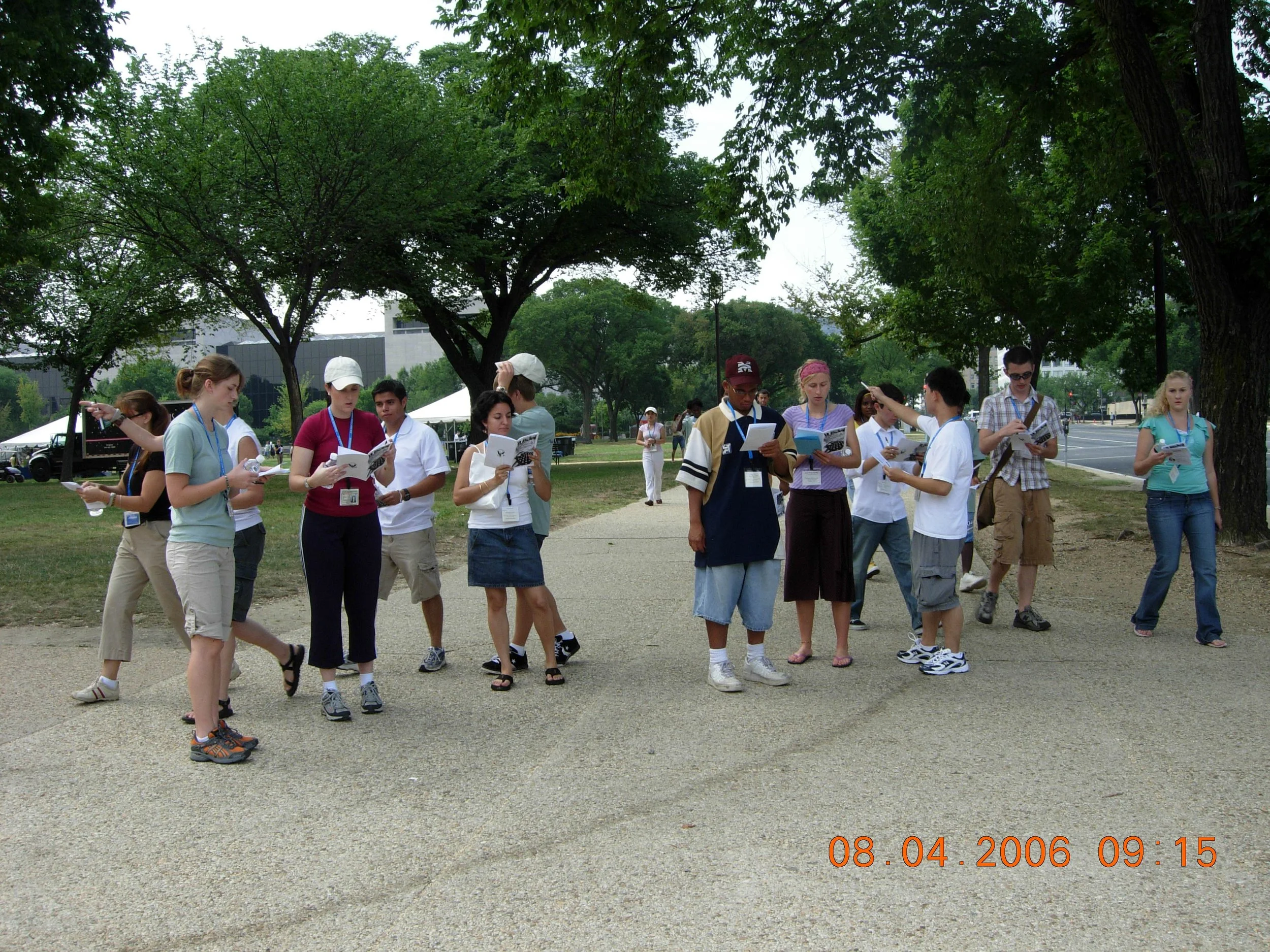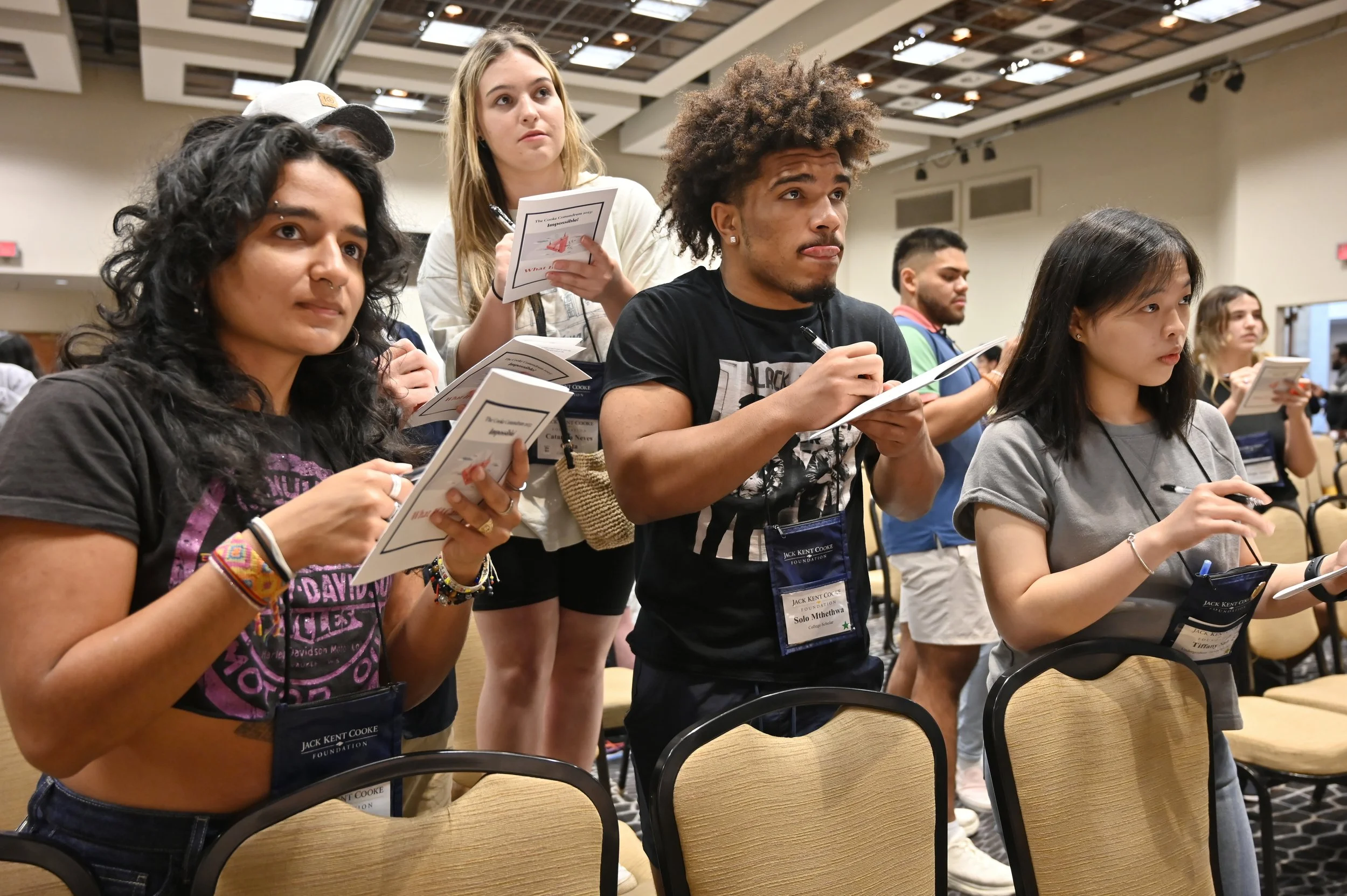20 Years of Cooke Conundrum: The Scholars Weekend Tradition that Never Fails to Puzzle the Community
For any Cooke Scholar who has attended a Scholars Weekend in the past two decades, they’re probably familiar with the famous, or infamous (depending on who you ask), Cooke Conundrum. This hours-long team activity encourages Scholars to work together to solve a series of experiential puzzles that rely on various skills and problem-solving abilities in the group. In this blog, we share the history of the Cooke Conundrum.
The Cooke Conundrum is more than just a weekend activity for new Cooke Scholars; for many returning Scholars and Alumni, it’s a cherished tradition that has challenged minds, fostered friendships, and inspired creative thinking across programs.
The idea behind Cooke Conundrum predates the Jack Kent Cooke Foundation. Michael Ling and Stephen Roberts, the current Conundrum designers, have been friends for over 39 years and have created and participated in puzzle-solving games throughout their friendship. Along with their friend Tom Buhrman, they spent their college years designing engaging, interactive, and day-long games for their friends.
In 2004, the Foundation was searching for an activity to incorporate into Scholars Weekend. Elizabeth Morgan, who was the Director of Youth Programs at the Foundation, went to school with Michael and Tom and had played a few of these games. During the activity search in 2004, Liz advocated for Michael and Tom’s puzzle events.
Tasked with creating an activity that would “creatively engage people’s minds and bodies and occupy a place on the agenda where they could get to know each other a little bit,” Michael and Tom set forth to design a unique activity, drawing on their years of experience with puzzles and keeping the Cooke Scholars community in mind.
Their proposal to scale up their events was accepted, and the first Cooke Conundrum took place on Georgetown University’s campus. Over the years, the Conundrum has been held at Georgetown University, Johns Hopkins University, the National Conference Center, and even the National Mall in Washington D.C.
The Foundation’s Vice President of Scholarship Programs, Natalie Rodriguez Jansorn, shared that from the very beginning, the Foundation recognized it had a community of very ingenious individuals who would enjoy the intellectual challenge of solving puzzles with their peers.
“I remember seeing other staff participating in the game and I had this feeling of that it was instantly part of the fabric of who we are as the Cooke Foundation,” said Natalie Jansorn. “We were interwoven in that fabric. I always sensed that it was always supposed to be a part of who we are.”
When Tom Buhrman left the central design team in 2008 due to personal and professional responsibilities, Stephen Roberts joined Michael in designing subsequent puzzles.
Over the past twenty years, the Conundrum has undergone various changes, including a hiatus in 2010 and a shift to virtual formats in 2020 and 2021 due to the pandemic. By 2022 and 2023, the game returned to its full format, with Michael and Stephen once again collaborating, reflecting their continued dedication to both innovation and tradition.
“What we try to do with these puzzles is we try to present the players with something that doesn't make sense initially, but if you talk it through with your teammates and look for patterns, you can figure out what's going on,” said Stephen. “There's an aha moment where you get it and you get to say, ‘This is what's going on.’”
For the puzzle designers, taking pride in creating something unique is paramount. They enjoy working with other creative individuals who bring their ideas to life.
Stephen shared, “I love the process of designing this game, but it is so satisfying to watch people play it. One of the great benefits for me is just seeing different ways that people think through these puzzles.”
When the activity kicks off, small groups of Scholars venture around the puzzle space to search for puzzles, riddles, and clues that they must decipher.
“What’s fun is when you are walking around the Conundrum, weaving in and out of the different groups, and you see an incoming first-year Scholar hunched over solving a puzzle with a non-traditional Transfer Scholar, and they seem like they’ve been collaborating for a very long time. It turns out they just met two minutes before the game started,” said Natalie. “It’s not about who can solve the puzzle; it’s about how can we connect with people in our community very quickly when faced with these low-stakes challenges.”
2024 marks twenty years since the first Conundrum, and the game has been played by thousands of Cooke Scholars and Alumni. For Michael Ling, organizing Conundrums has been a unique and exciting opportunity as a puzzle designer.
“If you had told me in in college, ‘You're going to be putting on an event for almost 200 people at a Conference Center that is dedicated entirely to your activity. And for the hours that you're running it, you can go wherever you want and put puzzles anywhere in the space.’ I would’ve been like, ‘Yeah, that's my dream.”
This passion for creating engaging and memorable experiences doesn’t stop with Michael. Stephen shares a similar enthusiasm for the Conundrum’s future.
“I’m looking forward to continuing to do this event. I hope that we’re still doing it in 20 years,” said Stephen. “People want to play, and people need to play. The Conundrum is a different way to play and have fun, and I love helping make that for people.”
Cooke Scholars taking notes during the kickoff of the 2023 Cooke Conundrum.











